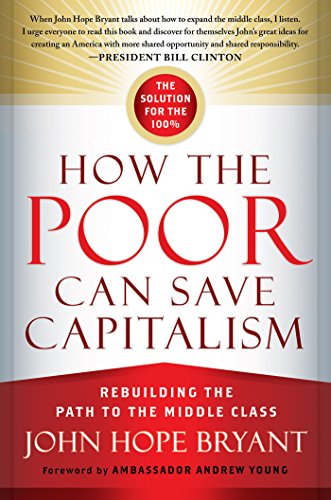How the Poor Can Save Capitalism
Rebuilding the Path to the Middle Class
John Hope Bryant
BOOK REVIEW

In a world that often casts the marginalized into the shadows, How the Poor Can Save Capitalism: Rebuilding the Path to the Middle Class emerges as a beacon of hope. Author John Hope Bryant, a renowned entrepreneur and activist, dares to challenge the status quo, arguing fervently that the path to economic rejuvenation lies not within the coffers of the elite but among the vibrant, untapped potential of the impoverished. This book invites you to shatter the misconceptions of poverty and embrace the radical idea that the very people society often overlooks hold the keys to a prosperous future.
Bryant's masterful prose resonates with a deep understanding of the complexities surrounding poverty and economic disparity. He implores us to rethink our approach to capitalism-not merely as a mechanism of wealth distribution, but as a tangible vehicle for empowerment and upliftment. Through compelling narratives enriched by his own experiences, Bryant illustrates how the confluence of innovation and community can dismantle systemic barriers that impede progress.
The pages of this transformative work pulse with urgency, compelling readers to confront uncomfortable truths about America's socio-economic landscape. 🤯 "Poverty does not inhibit potential; it often catalyzes it!" Bryant asserts boldly. He reminds us that every great invention and social change emerged from the crucible of adversity. The narrative isn't merely theoretical; it's backed by firsthand accounts and evidence that demand our attention. He champions for financial literacy and access to capital, underscoring how these elements can empower low-income individuals to transform their lives and contribute to the economy in profound ways.
Critics of Bryant's perspective may surface, raising eyebrows at the audacity of such claims. Some cite that the burdens of poor economic policy and systemic inequalities create insurmountable walls. However, Bryant nudges skeptics toward a critical epiphany: revitalizing the economy isn't just about trickle-down economics. It's about creating pathways and frameworks that allow individuals from all backgrounds to thrive. His approach evokes a visceral reaction, forcing us to reflect on the ethical implications of our societal structures.
The historical context surrounding this work is as potent as its content. Published in the wake of the 2008 financial crisis and amid growing discussions about income inequality, Bryant's voice stands out as not just a critique but a clarion call for actionable change. It echoes the sentiments of civil rights leaders of the past, blending social justice with economic empowerment, as he positions the poor not as passive beneficiaries but as active agents of change.
Bryant's exploration goes beyond mere statistics; it's an emotional journey that pulses with life. He paints vivid pictures of individuals transforming their circumstances, evoking feelings of hope and agency that linger long after the last page is turned. How many stories go untold? How many innovative ideas are stifled by a lack of resources? As you read, you'll find yourself grappling with the reality that the potential to heal and rejuvenate our economy lies in recognizing those who have long been relegated to the periphery. 🌍✨️
The pull of this book is so powerful that it's no wonder readers have been captivated, sharing their revelations with friends and family, sparking discussions about philosophy and economics in coffee shops and living rooms across the nation. Testimonials abound, with many proclaiming that Bryant's insights have changed their perspectives on wealth. Some even argue it's a blueprint for addressing the inequality that plagues our society.
However, criticism arises as well. Some argue that Bryant's optimistic vision skates too closely to idealism, asserting that empowering the poor requires more systemic change than individual action. While this critique has merit, it merely reinforces the urgency of Bryant's call to action. The challenges abound, but he urges us not to lose sight of the possibilities.
Ultimately, How the Poor Can Save Capitalism is more than an invitation to reassess our economic beliefs-it's an urgent plea for compassion, innovation, and solidarity. It challenges you, dear reader, to rethink your role in this narrative, to step up as an ally in reforming capitalism from the ground up. Your heart will race as you ponder these critical questions: What if the answers we seek lie not in the elite boardrooms, but in the stories of resilience that exist within every underprivileged community?
Dive into Bryant's narrative, and you might just find yourself transformed. 🌟 The urgency of this call is palpable; let it lead you toward action, introspection, and a renewed understanding of the vibrant potential that resides within every individual, regardless of their socio-economic standing. Will you heed the call?
📖 How the Poor Can Save Capitalism: Rebuilding the Path to the Middle Class
✍ by John Hope Bryant
🧾 176 pages
2015
#poor #save #capitalism #rebuilding #path #middle #class #john #hope #bryant #JohnHopeBryant